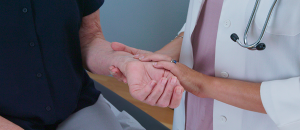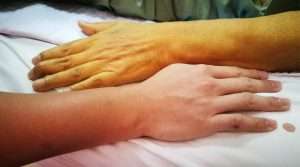
Care for liver cirrhosis patients.
Caring for someone with liver cirrhosis requires a comprehensive approach to manage symptoms, prevent complications, and improve the overall quality of life. It's essential to work closely with healthcare professionals for personalized advice based on the specific needs of the individual. Here are some general guidelines:
Medical Management:

Medical management of liver cirrhosis involves addressing the underlying cause, managing symptoms, and preventing complications. Here are key aspects of medical management for liver cirrhosis:
Treatment of Underlying Cause:
- If the cirrhosis is caused by conditions like chronic viral hepatitis, autoimmune diseases, or alcoholic liver disease, specific treatments for these underlying causes may be necessary.
Medications:

Hepatitis C:
Antiviral medications can be used to treat chronic hepatitis C infection.
Hepatitis B:
Antiviral medications can help control the replication of the hepatitis B virus.
Autoimmune Hepatitis:
Immunosuppressive drugs may be prescribed to manage autoimmune hepatitis.
Complications:
Medications may be prescribed to manage symptoms and complications, such as diuretics for fluid retention or beta-blockers for portal hypertension.
Nutritional Support:
- Nutritional deficiencies are common in cirrhosis. Nutritional supplements or dietary changes may be recommended to address deficiencies in vitamins and minerals.
Variceal Bleeding Prevention:
- Beta-blockers or endoscopic procedures may be used to reduce the risk of bleeding from varices (enlarged veins in the esophagus or stomach).
Ascites Management:
- Diuretics may be prescribed to manage ascites (accumulation of fluid in the abdominal cavity).
- Paracentesis, a procedure to drain fluid from the abdomen, may be done in severe cases.
Hepatic Encephalopathy Treatment:
- Lactulose or other medications may be prescribed to manage hepatic encephalopathy (confusion and altered mental function).
Regular Monitoring:
- Liver function tests, imaging studies, and other diagnostic tests will be regularly conducted to monitor the progression of cirrhosis and assess liver function.
Liver Transplantation:
- In severe cases, when cirrhosis is advanced and complications cannot be controlled, liver transplantation may be considered as a treatment option.
Vaccinations:
- Vaccinations against hepatitis A and B are important to prevent further liver damage.
Patients must work closely with their healthcare team, including hepatologists and gastroenterologists, to develop an individualized treatment plan. Compliance with medications, regular follow-up appointments, and lifestyle modifications are essential components of medical management for liver cirrhosis. Always consult with healthcare professionals for specific recommendations tailored to the patient's condition.
How to remove kidney stones naturally?
Diet and Nutrition:

Diet and nutrition play a crucial role in managing liver cirrhosis. A well-balanced and carefully planned diet can help support liver function, prevent complications, and improve the overall health of individuals with cirrhosis. Here are dietary recommendations for liver cirrhosis patients:
Balanced Diet for liver cirrhosis patients:
- Consume a well-balanced diet that includes a variety of food groups such as whole grains, lean protein, fruits, and vegetables.
Protein Intake:

- Opt for high-quality protein sources like lean meats, poultry, fish, eggs, dairy products, and plant-based proteins.
- Protein is important for maintaining muscle mass, but excessive protein intake should be avoided.
Limit Sodium Intake:

- Reduce sodium intake to help manage fluid retention (edema) and prevent complications like ascites.
- Avoid high-sodium processed foods, canned soups, and salty snacks.
Fluid Management:
- Monitor fluid intake, but do not restrict fluids unless healthcare providers advise.
- Healthcare providers may recommend a controlled fluid intake in cases of significant fluid retention.
Avoid Alcohol:

- Completely abstain from alcohol consumption, as it can exacerbate liver damage.
Vitamin and Mineral Supplements:
- Address any nutritional deficiencies by taking prescribed vitamin and mineral supplements, as liver cirrhosis can lead to deficiencies in certain nutrients.
Small, Frequent Meals:
- Consume small, frequent meals throughout the day rather than a few large meals. This can help manage energy levels and prevent overloading the liver.
Limit Sugar and Refined Carbohydrates:
- Reduce the intake of sugary foods and beverages, as well as refined carbohydrates.
- Opt for complex carbohydrates like whole grains, fruits, and vegetables.
Fiber-Rich Foods:
- Include fiber-rich foods such as whole grains, fruits, vegetables, and legumes to promote digestive health.
Be Cautious with Dietary Supplements:
- Consult healthcare providers before taking any dietary supplements, as some may interact with medications or have adverse effects on the liver.
Monitor Portion Sizes:
- Be mindful of portion sizes to avoid overeating and putting additional strain on the liver.
Individuals with liver cirrhosis need to work closely with a registered dietitian or healthcare provider to create a personalized nutrition plan. Dietary needs may vary based on the severity of cirrhosis, the presence of complications, and individual health conditions. Regular monitoring and adjustments to the diet plan may be necessary. Always follow the guidance of healthcare professionals for the best outcomes.
Fluid Management:

Fluid management is a crucial aspect of caring for individuals with liver cirrhosis, especially when complications like ascites (accumulation of fluid in the abdominal cavity) are present. Here are some guidelines for fluid management in liver cirrhosis patients:
10 effective Ways for Weight Loss
Monitor Fluid Intake and Output:
- Keep track of daily fluid intake and output to ensure a proper balance.
- Maintain a fluid intake diary if needed.
Fluid Restriction (if advised):
- In cases of severe ascites or edema, healthcare providers may recommend fluid restriction.
- Limiting sodium intake is often part of fluid restriction.
Sodium Restriction:

- Reduce sodium (salt) intake to help control fluid retention.
- Avoid high-sodium foods such as processed and canned foods, salty snacks, and pickled foods.
Diuretics:
- Diuretic medications may be prescribed to promote urine output and reduce fluid retention.
- Follow the prescribed dosage and report any side effects or concerns to healthcare providers.
Weight Monitoring:
- Regularly monitor body weight, ideally daily, to detect changes related to fluid retention.
- Rapid weight gain may indicate fluid accumulation.
Avoidance of Excessive Fluid Intake:
- Limit the consumption of excessive fluids, especially if fluid retention is a concern.
- Be mindful of hidden sources of fluids, such as soups and watery fruits.
Frequent Position Changes:
- Changing positions frequently, such as moving from sitting to standing, can help mobilize excess fluids.
Compression Stockings:
- Compression stockings may be recommended to help reduce swelling in the legs.
Paracentesis (if necessary):
- In cases of severe ascites, healthcare providers may perform paracentesis, a procedure to drain excess fluid from the abdominal cavity.
Regular Follow-Up:

- Attend regular follow-up appointments with healthcare providers to monitor fluid status and adjust the treatment plan as needed.
Individuals with liver cirrhosis and their caregivers need to communicate regularly with healthcare providers about any changes in symptoms, fluid balance, or concerns. Fluid management strategies may vary based on the severity of cirrhosis, the presence of complications, and individual health conditions. Always follow the specific recommendations provided by the healthcare team for the best outcomes.
Symptom Management:

Symptom management is a crucial aspect of caring for individuals with liver cirrhosis. The symptoms associated with cirrhosis can vary, and the goal is to alleviate discomfort, improve quality of life, and prevent complications. Here are some general guidelines for symptom management:
Fatigue:
- Ensure adequate rest and sleep.
- Plan activities to conserve energy and avoid excessive exertion.
- Incorporate gentle exercises to improve energy levels.
Itching (Pruritus):
- Keep the skin clean and moisturized.
- Use mild, fragrance-free soaps and moisturizers.
- Avoid hot water during baths or showers.
- Consult healthcare providers for medications that may help alleviate itching.
Abdominal Discomfort:

- Use supportive measures like a pillow for comfort.
- Avoid tight clothing around the abdomen.
- Over-the-counter pain relievers may be recommended, but always consult with healthcare providers first.
Ascites:
- Follow fluid management strategies as advised by healthcare providers.
- Take diuretic medications as prescribed.
- In severe cases, paracentesis may be performed to drain excess fluid from the abdominal cavity.
Encephalopathy (Confusion):
- Strictly adhere to prescribed medications, such as lactulose.
- Monitor mental function and report any changes to healthcare providers promptly.
Muscle Cramps and Weakness:
- Ensure an adequate intake of nutrients, including potassium and magnesium.
- Gentle exercises and stretching may help reduce muscle cramps.
Nausea and Vomiting:

- Eat small, frequent meals.
- Avoid greasy or spicy foods.
- Anti-nausea medications may be prescribed by healthcare providers.
Bleeding and Bruising:
- Follow any recommended dietary restrictions related to blood clotting.
- Avoid activities that may increase the risk of injury.
- Report any signs of bleeding to healthcare providers immediately.
Jaundice:

- Manage underlying liver disease and follow prescribed treatment plans.
- Report any changes in skin or eye color to healthcare providers.
What to Do in Case of Jaundice Apart from Taking Medicine.
Fluid Retention (Edema):
- Follow fluid and sodium restriction recommendations.
- Elevate legs when sitting or lying down to reduce swelling.
Regular Follow-Up:
- Attend regular check-ups and follow-up appointments with healthcare providers to monitor symptoms and adjust the treatment plan.
Individuals with liver cirrhosis must communicate openly with their healthcare team about any new or worsening symptoms. The management of symptoms is often individualized, and healthcare providers can provide specific recommendations based on the patient's condition and needs. Always follow the guidance of healthcare professionals for the best outcomes.
Regular Exercise:

Regular exercise is beneficial for individuals with liver cirrhosis, as it can contribute to improved overall health, muscle strength, and well-being. However, the type and intensity of exercise should be tailored to the individual's specific condition, and it's crucial to consult with healthcare providers before starting any exercise program. Here are some general guidelines for incorporating regular exercise into the care of liver cirrhosis patients:
Consult Healthcare Providers:
- Before starting any exercise program, consult with hepatologists, gastroenterologists, or healthcare providers familiar with the patient's medical history and condition.
- Ensure there are no contraindications or specific restrictions related to the individual's health status.
Start Gradually:
- Begin with low-impact activities and gradually increase intensity over time.
- Activities such as walking, swimming, or stationary cycling are good options for starting.
Aim for Regularity:
- Strive for consistency in exercise routines.
- Aim for at least 150 minutes of moderate-intensity aerobic exercise per week, as recommended for general health by health organizations.
Strength Training:
- Incorporate light resistance training or strength-building exercises to improve muscle strength.
- Focus on major muscle groups but avoid heavy lifting or straining.
Flexibility and Stretching:
- Include flexibility exercises to maintain joint mobility.
- Gentle stretching can help prevent muscle stiffness and improve overall flexibility.
Balance and Coordination:
- Incorporate activities that enhance balance and coordination to reduce the risk of falls.
- Tai chi or yoga may be beneficial.
Listen to the Body:
- Pay attention to how the body responds to exercise.
- If there is fatigue, pain, or any discomfort, it's important to modify or stop the activity and consult healthcare providers.
Hydration:

- Stay well-hydrated, especially during exercise.
- Consult with healthcare providers about fluid intake recommendations.
Avoid High-Risk Activities:
- Avoid activities with a high risk of injury or trauma to the abdomen.
- Consult healthcare providers regarding any specific exercise restrictions.
Consider Professional Guidance:
- Consider working with a physical therapist or certified fitness professional experienced in working with individuals with chronic health conditions.
Regular Monitoring:
- Regularly monitor how exercise affects the individual and discuss any changes or concerns with healthcare providers during follow-up appointments.
Exercise should be approached with caution, especially for those with advanced liver cirrhosis or significant complications. Individual exercise plans will depend on the severity of the condition and the presence of complications. Always follow the guidance of healthcare professionals to ensure that exercise is safe and appropriate for the individual's specific circumstances.
Avoidance of Toxins:

Avoiding toxins is crucial for individuals with liver cirrhosis, as the liver is already compromised and may have difficulty processing harmful substances. Here are some key considerations for avoiding toxins in care for liver cirrhosis patients:
Alcohol Abstinence:
- Complete abstinence from alcohol is essential for individuals with liver cirrhosis, especially if alcohol-related liver disease is the underlying cause.
- Even small amounts of alcohol can exacerbate liver damage and increase the risk of complications.
Medication Safety:
- Consult healthcare providers before taking any over-the-counter medications, herbal supplements, or vitamins, as some substances can be harmful to the liver or may interact with prescribed medications.
- Inform healthcare providers about all medications, including prescription and non-prescription drugs.
Avoidance of Hepatotoxic Substances:
- Steer clear of substances known to be hepatotoxic (harmful to the liver). This includes certain chemicals, drugs, and industrial toxins.
- Occupational exposure to toxins should be minimized or eliminated where possible.
Environmental Toxin Awareness:
- Be mindful of environmental toxins and pollutants that may affect liver health. This includes exposure to chemicals, fumes, and other environmental hazards.
- Take necessary precautions to minimize exposure at home and in the workplace.
Proper Food Handling:
- Practice safe food handling to prevent foodborne illnesses. Hepatitis A and E infections can be particularly risky for individuals with liver cirrhosis.
- Ensure that food is cooked thoroughly and avoid consuming raw or undercooked seafood and meats.
Vaccinations:
- Stay up-to-date on vaccinations, including those for hepatitis A and hepatitis B.
- Hepatitis A and B vaccinations can prevent additional liver damage and complications.
Avoiding Tobacco Smoke:
https://livewithgreen.com/how-to-care-for-liver-cirrhosis-patients/
.jpg)